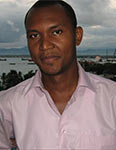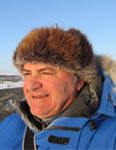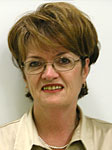The Team
The chairholder

Gérard Duhaime
M.A. Political Science
Gérard Duhaime is a sociologist (economic sociology) and political scientist (political analysis). He conducts research programme on social change, the economy, development, mass consumption and indebtedness.
He has been teaching sociology at Université Laval since 1988, initially within consumer sciences programmes, and since 2002 with the Department of Sociology of the Faculty of Social Sciences. He supervises the work of several post-graduate students, most of whom are participating in major research projects.
He has published several books and papers, edited collective works, and given many conferences. His books include: Arctic Food Security (CCI Press, 2008), La vie à crédit, consommation et crise (PUL, 2003), Le Nord, Habitants et Mutations (PUL, 2001), De l’Iglou au HLM, Les Inuit sédentaires et l’État-Providence (CEN, 1985).
Former president of the International Arctic Social Sciences Association (IASSA), co-founder of the Circumpolar Arctic Social Sciences Ph.D. Network (CASS), member assigned by the International Council for Science to the International Polar Year Planning Committee, he played an important role in the integration of the social issues and communities of the North to the programme of the International Polar Year. He assumed many scientific and social responsibilities abroad (University of Lapland, Roskilde University), in Canada (University of Alberta) and in Quebec (Nunavik Commission). Finally, he held several positions in administration and scientific discussion at Université Laval before setting up the Louis-Edmond-Hamelin Chair for Nordic social sciences research, funds created for the purpose of supporting advanced studies, and being offered to create the Canada Research Chair in Comparative Aboriginal Conditions.
The results of the work he directs are covered by the press on a regular basis. The magazines Innovation Canada, Québec Science and Revue Notre-Dame have devoted articles to his background and to his works.
Director of the databanks

Andrée Caron is the holder of a master degree in sociology. She has been working with the Chair since 2002, initially as a researcher and then as director of the Nunivaat and ArcticStat databanks, which she conceived and implemented in close collaboration with a team of computer specialists. She is responsible for the contents, development and update of the databank. She directs a team of students charged with assisting her in this work. She is also responsible for the conception and implementation of the Chair's websites. Furthermore, she actively participates in several research projects, conducted within the framework of the Chair's scientific programme, and she contributes to the academic supervision of the students.
Associated researchers

Roberson Édouard is working with the Chair in various capacities since 2004. He holds a doctorate in sociology of development (Université Laval, Québec). He teaches sociology and social sciences research methods at Université Laval, Université d’État d’Haiti and Cégep Garneau. For about ten years, he is studying various development issues including poverty, exclusion and violence. He has to his credit several books and articles, including Violences et ordre social en Haïti. Essai sur le vivre-ensemble dans une société postcoloniale (PUQ, 2013) ; Les soins de santé primaires. Critiques d’une orthodoxie (PUQ, 2010) ; Une société parallèle : la vocation du peuple? Essai sur le dédoublement de la société haïtienne (L’Harmattan, 2009).

Jean Robitaille
M.A. Measurement and evaluation
Jean Robitaille is an economist specializing in the econometric modeling of consumer behavior. It is also psychometer (measurement and evaluation). His research interests cover matters such as assessing the economic value of household non-paid domestic production, debt and the use of consumer credit and the development of methodologies for assessing the cost of life between different geographical regions.
Since 1998 he teaches quantitative methods and microeconomic theory of consumer at the department of food economy and consumer sciences at Université Laval. In 2000, he received an award of excellence from the American Council on Consumer Interests (ACCI), together with the US Bureau of Labor Statistics (BLS), for his research on the conceptual and empirical refinement of the methodological approach the opportunity cost for the assessment of the economic value of household production. He is the recipient of the teaching excellence award Paul-Gervais of 2002 and a teaching excellence award of North American Colleges and Teachers of Agriculture (NACTA) in 2003.

Daniel Troy made career with the Correctional Service of Canada as a Parole Officer for almost thirty (30) years. Graduated from Université de Montréal in criminology (Bachelor degree), he worked as first-line speaker. For much of his career, he served as Liaison Officer with the Prison des femmes (Maison Tanguay), the Waseskun Center and the Mohawk community of Akwesasne. It was at this time he was introduced to the realities of Inuit and Aboriginal communities. Since his retirement in 2011, he conducted as a consultant, working with BDL firm on behalf of the Kativik Municipal Housing Bureau (KMHB), a full survey on the household composition in all Nunavik communities dwellings. Since September 2014, he works as a Research Associate and Field Coordinator for the survey Cost of Living in Nunavik.
Research professionals

Sébastien Lévesque (M.A. Sociology) joined the Chair's team in 2011 and occupies a research professional position since 2014. His main areas of expertise are social statistics and questions related to social and economic inequalities in Indigenous contexts. As part of the Chair's work, he is involved in several research projects and is the lead analyst of the Nunivaat social statistics program.

Marileine Baribeau
Postdoctoral Fellow

Administrative assistant

Lise Girard-Fortin has been administrative assistant at the Chair since its creation. She has the same functions at the Interuniversity Centre for Aboriginal Studies and Research of Université Laval. Her extensive experience allows the members of the Chair to carry out their work in the best administrative and logistical conditions possible.
The students and research assistants
Alain PARENT
NEWS
La Chaire Louis-Edmond-Hamelin de recherche nordique en sciences sociales annonce la tenue de son concours de bourse d’excellence, de bourse de fin de rédaction et de subvention à la mobilité pour les étudiants inscrits à la maîtrise ou au doctorat. Les dossiers doivent être déposés au plus tard le 3 novembre 2023. Les conditions d'admissibilité ainsi que les modalités d'inscription sont disponibles sur le site de la chaire.
NOUVEAU RAPPORT DE RECHERCHE
Le rapport de recherche intitulé
Households, governments, and corporations as economic actors: A pilot project on inequality in the circumpolar Arctic est maintenant disponible. Cette recherche vise à identifier, dans les régions Arctiques circumpolaires, la composition des revenus de trois agents économiques (les ménages, les gouvernements et les entreprises), en portant une attention particulière sur les ménages. Il peut être consulté en version anglaise.
LES CONSÉQUENCES DE L'INFLATION SUR LE COÛT DES ALIMENTS AU NUNAVIK
Radio-Canada a interviewé Sébastien Lévesque, professionnel de recherche, sur les travaux de la chaire concernant le coût des aliments au Nunavik. Un article est paru sur le site web de Radio-Canada, ainsi qu’un reportage audio à l’émission L’heure du monde.
ATTRIBUTION DES BOURSES DE LA CHAIRE LOUIS-EDMOND-HAMELIN
La Chaire Louis-Edmond-Hamelin de recherches nordiques en sciences sociales a récemment procédé à l’attribution de ses bourses annuelles. Les lauréates sont : Mme Sabrina Bourgeois, candidate au doctorat en science politique (bourse de fin de rédaction) et Mme Alice Miot-Bruneau, candidate au doctorat en anthropologie (subvention à la mobilité). Toutes nos félicitations aux lauréates.
NOUVELLE PARUTION
L'article Northern border management: different perceptions from Canada’s Arctic and Northern Policy Framework, a été publié récemment dans la revue Polar Geography. Dans cet article, Karen Everett examine comment le gouvernement fédéral et les partenaires nordiques abordent la gestion des frontières en utilisant une approche globale de la sécurité qui encadre l'analyse dans les cinq secteurs de sécurité de l'École de Copenhague (militaire, politique, sociétal, économique et environnemental).
